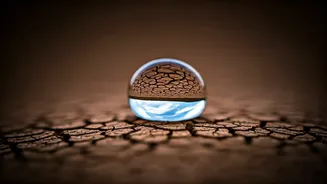Thirst vs. Hunger
Our brains can sometimes play tricks on us. One of these tricks is confusing thirst with hunger. Feeling like you constantly need a snack or finding yourself
hungry shortly after eating might mean you simply need water. The next time you experience these cravings, try drinking a glass of water first. This simple action can often satisfy your body's true need and prevent unnecessary snacking, ultimately helping you stay on track with your health goals. This is a common pitfall we can easily avoid by staying mindful of our hydration levels.
Urine Color Speaks
One of the most apparent indicators of dehydration is the color of your urine. When your body has adequate fluids, your urine appears light yellow or even almost clear. However, dark yellow or amber-colored urine signals a need for more hydration. This change happens because your kidneys are working harder to conserve water. So, if you notice your urine is darker than usual, it's time to reach for that water bottle! Monitoring urine color is a straightforward way to keep tabs on your hydration level daily, ensuring you meet your body's water requirements.
Heartbeat and Dizziness
Dehydration can impact your cardiovascular health. When your body lacks sufficient fluids, blood volume decreases, causing your heart to work harder to circulate blood. This increased effort can lead to a faster heart rate, and it can also cause dizziness or lightheadedness, particularly when you stand up quickly. These symptoms happen because the brain doesn't get enough blood flow due to the lower blood volume. If you often experience these sensations, make sure you're drinking enough water, especially during exercise or in warm weather, when you lose more fluids through sweat.
Persistent Headaches
Headaches can be another sign of dehydration. The brain needs adequate fluid for optimal function. Insufficient water can reduce the fluid surrounding the brain, which can lead to headaches or even migraines. If you often experience a dull headache upon waking up or during the day, inadequate hydration might be the culprit. Staying properly hydrated can help alleviate headache frequency and intensity, so make sure you're drinking enough water regularly. Keeping a water bottle close by can serve as a constant reminder to drink, assisting in preventing these uncomfortable symptoms.
Dry Skin and Lips
Your skin requires water to maintain its elasticity and plumpness. When you're dehydrated, your skin may become flaky, tight, or itchy. Additionally, dry or chapped lips are a common and visible sign of a lack of hydration. If you notice these symptoms, it is a clear indication that your body needs more fluids. Proper hydration will help your skin cells stay healthy and function well, giving you that fresh, glowing look. Applying moisturizers can help, but addressing the root cause by drinking enough water is crucial for long-term skin health and overall comfort.
Constant Fatigue Lingers
Dehydration can significantly affect your energy levels. Insufficient water affects oxygen flow throughout your body and slows circulation, leaving you feeling tired or sluggish even after a full night's sleep. Your body uses water in virtually every process, and if you are not getting enough, these functions begin to struggle. Staying adequately hydrated boosts energy levels naturally by ensuring efficient circulation and delivery of nutrients to your cells. Incorporating water consumption into your daily routine can help you maintain consistent energy levels and prevent fatigue throughout the day.

















